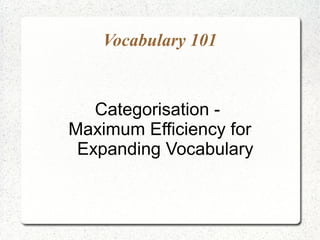
Maximizing Vocabulary with Categorization
- 1. Vocabulary 101 Categorisation - Maximum Efficiency for Expanding Vocabulary
- 2. Learning Objectives To learn that words can belong to the same family class. To expand our vocabulary in the same lexical field using our knowledge of prefixes and suffixes.
- 3. Introduction When you come across new words, you must be able to store it efficiently. Just like a library indexes millions of books so it can be easily found, our brain has its own way of indexing information too in categories. 1) School – CCA, studies, homework, teacher 2) Friend – study, play, talk, encourage When you think about these two categories, these are the words or facts you can remember.
- 4. How our brain works • Through the process of categorisation, our brains store many facts. • Try it yourself. Think about these words: 1) MacDonalds 2) December School Holidays 3) Examinations Q: Can you recall many facts about these 3 words? Categories help you improve vocabulary knowledge.
- 5. Categorisation Categorisation classifies all words that belong to the same family class together. Prefixes, suffixes and root words also help us categorise the words we learn. Practicing this skill, we are able to store and recall words for use easily... ... just like how a librarian stores books according to their indexes!
- 6. Learning Activity Using prefixes, root words and suffixes to help you, rearrange these words according to these categories. Organise them using the Fishbone: Sports / Occupation / Manner of Actions Baker Swimmer Courageously Quicker Cheerfully Running Doctor Swimming Carefully Cycling
- 7. Learning Activity Answers The terms that fall the 3 categories are: 1) Sports – Swimming, Cycling, Running 2) Occupation – Baker, Swimmer, Doctor 3) Manner of Actions – Cheerfully, Carefully Courageously, Quicker
- 8. Discussion • Why is it necessary to rearrange the words we learn into patterns? • When we are grouping words into families of words, what are we doing? • What method can we use to organise words?
- 9. In Summary • To help us to store and recall them for use later easily. • We are putting words into categories. • The Fishbone Technique.
- 10. In Summary • To help us to store and recall them for use later easily. • We are putting words into categories. • The Fishbone Technique.
